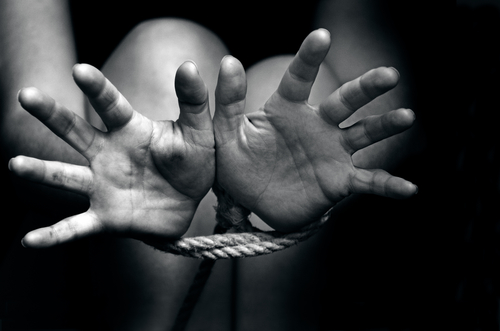NEW YORK (RNS) At the beginning of the 21st century, Americans are used to thinking of slavery as a horror, yes, but one that was banished from these shores nearly 150 years ago. If only that were so.
The trafficking of men, women and children for labor or sexual exploitation — or both — fuels an underground economy of misery in our midst in many major metropolitan areas and even in rural America. Immigrants without legal status, children in foster care — all those with tenuous community roots — are particularly vulnerable to exploitation.
The U.S. Department of Justice estimates that more than 300,000 children are at risk of being prostituted in the U.S. and that the average age of entry into prostitution for a child victim here is 13 to 14 years old. According to the DOJ, a pimp can make $150,000 to $200,000 per child each year, and the average pimp controls four to six girls. The United Nations estimates that traffickers generate more than $9 billion within the U.S. for both labor and sex trafficking.
Within the Jewish community, efforts to combat trafficking date back to the early 1900s, when members of the National Council of Jewish Women, among others, met the boats of immigrants from Europe in order to protect young women from traffickers. Today, many are still engaged in today’s struggle to keep the vulnerable from traffickers, including mobilizing resources to spur the federal government to increase its focus on this scourge.
The White House recently released the first-ever Federal Strategic Action Plan on Services for Victims of Human Trafficking in the United States, which acknowledges that human trafficking ensnares U.S. citizens and foreign nationals, adults and children, and men, women and transgender individuals.
But apart from federal efforts, anti-trafficking forces must come together on a unified agenda. Overcoming the lack of public awareness of the scope of the problem must be high on that list. Advocates should work to address the critical lack of data that impedes efforts to address trafficking and assist its victims. We should build support for securing public and private resources to collect the data needed.
At the same time, a national effort must ensure funding for victim services, which are severely lacking in many parts of the country. It’s also essential to publicize information far and wide — to be sure trafficking victims are aware of hotlines, social services and advocacy groups that can help them escape their immediate oppression and offer long-term assistance in building a new life or regaining the one left behind.
A national anti-trafficking agenda should push the criminal justice system to stop holding women and children accountable while buyers and sellers are not prosecuted at all or receive minimal punishment. Laws and services must be reformed to treat survivors as victims, not criminals.
As a nation, we must provide “safe harbor,” both legally and materially — that is, guarantee that victims forced into illegal activity will not be prosecuted and that those victims will be provided with shelter, social services and the means to escape their oppressors.
Public officials must be held accountable to ensure that existing trafficking laws are enforced and that enforcement has sufficient funding. The buyers and sellers of children must be made criminally liable under consistently enforced laws. Victims under the age of consent should be presumed to be just that — victims — and not be prosecuted or penalized, but helped. The factors that make sex trafficking a high-profit/low-risk business must be addressed.
Children in foster care can be especially vulnerable to exploitation, and welfare systems must be adjusted to recognize that those in foster care can be targeted by traffickers. Missing children in foster care must be reported within 24 hours for their own protection, even if they are older teens.
Three measures pending in Congress deserve broad support:
- The End Sex Trafficking Act of 2013 seeks to strengthen and clarify the Trafficking Victims Protection Act to ensure that buyers of sex are prosecuted for contributing to modern-day slavery.
- The Human Trafficking Reporting Act of 2013 would amend the Omnibus Crime Control and Safe Streets Act of 1968 to include severe forms of trafficking in persons among the violent crimes required to be reported by states for the Uniform Crime Reports of the FBI.
- The Strengthening the Child Welfare Response to Human Trafficking Act would ensure that child victims of sex trafficking and labor trafficking in the U.S. are identified by state child welfare agencies and receive the services they need.
As a community formerly enslaved, Jews are compelled by our history to take action. There is no greater calling than to end what has become the third-largest criminal industry in the world — human trafficking. It’s time to open the curtains and truly address what is happening in our communities.

Nancy K. Kaufman is the CEO of the National Council of Jewish Women. Photo courtesy of National Council of Jewish Women
The women we welcomed off the boats in New York harbor a century ago began new lives of opportunity thanks to the efforts of women and Jews like us. We must honor our commitment to them and to our own values by defeating the scourge of trafficking that we sought to save our sisters from so many decades ago.
(Nancy K. Kaufman is chief executive officer of the National Council of Jewish Women, a grass-roots organization of volunteers and advocates who turn progressive ideals into action.)
KRE/MG END KAUFMAN






